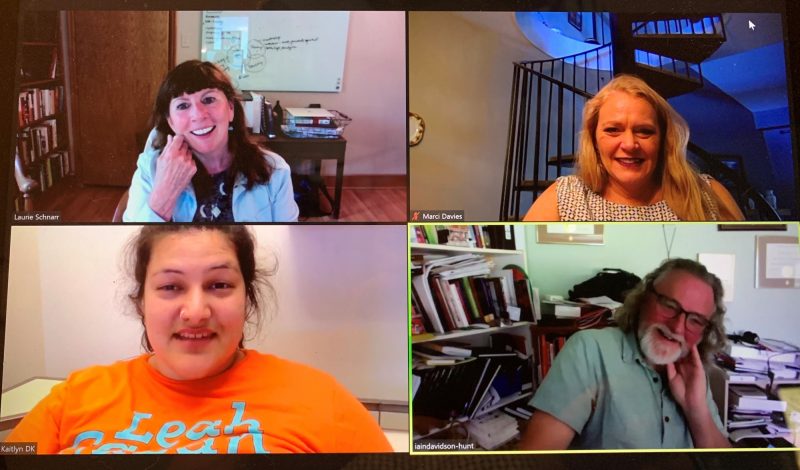
Kaitlyn Duthie-Kannikkatt, recipient of the Student Affairs Participation Award
Bowl of soup leads student to win academic award
Soup changed the trajectory of her life.
Kaitlyn Duthie-Kannikkatt was an undergrad student at Carleton University in her hometown of Ottawa when she was walking towards the university’s tunnel systems. For weeks prior, around lunch time, she’d make the same walk, always smelling enticing flavours wafting through the halls, and then one day she decided to find their source. She walked down a corridor and found tucked away in a room a community kitchen serving pay-what-you-can lunch for students to address campus food insecurity. She asked some questions, donated some money, and walked away with a bowl of soup. Soon after, she joined the other volunteers, providing food to fellow students, and eventually began coordinating the lunch services.
“Like everyone, you learn from people and get deeper into the issues by starting to engage with them, and I became a volunteer then an advocate and now I’m on this journey,” the PhD candidate in the UM’s Natural Resources Institute says.
Food justice became a passion for her and after graduating from Carleton she worked as a farmhand on some small, organic farms in the US, maritime Canada, and India, to learn more about the practice.
“I worked a few different places to gain an insider’s perspective on how things work and to get my hands dirty and learn by doing, and I think that really impacted my choice to pursue research and connect things together.”
Duthie-Kannikkatt, under the supervision of Iain Davidson-Hunt, now works in southern Bolivia studying how small-scale farmers are restoring the use of traditional seeds.
“Seeds are a really important part of people’s cultural identity and I want to understand what that relationship looks like,” she says. “Traditional seeds are not static. Small scale farmers are among the most innovative and have used seed varieties to suit their needs and adapt to the environment for generations. Many have maintained a relationship with traditional varieties that go into traditional recipes and you feel most at home in your culture when you’re eating the foods of your ancestors. Using traditional seeds does not mean you stop innovating; it’s about maintaining a cultural connection and finding ways to be creative about doing that, and about passing on the importance of that relationship with your seed, and the relationship with the land that nourishes your seeds for future generations.”
On June 8, Duthie-Kannikkatt was presented with the Student Affairs Participation Award, which honours a student who has maintained high academic achievement (Duthie-Kannikkat’s GPA is at 4.38) while demonstrating exceptional leadership qualities in making a significant voluntary contribution to the University and/or broader community since 1992.
“It was a tremendous honour to present Kaitlyn with this much-deserved award,” says Laurie Schnarr, Vice-Provost (Students). “At a time when we are navigating many challenges stemming from the pandemic and the shift to remote working and learning, Kaitlyn serves as a wonderful reminder of the many invaluable contributions that students make to our university and the communities that surround our campus. I have no doubt that Kaitlyn will continue to make a transformative impact well beyond her time at the University of Manitoba.”
Duthie-Kannikkatt has been active with the Grad Student Association and has served on other committees such as the Joint Faculty Research Ethics Board, Presidential Dean Search Committee, and the Faculty of Graduate Studies’ appeals committee. Naturally, of course, she has also been a co-chair of the Canadian Association of Food Studies conference and a long-standing member of the Manitoba Energy Justice Coalition. But she also serves as coordinator and driver for the Barnone Prison Rideshare, which helps family members of prison inmates who want to visit but lack access to transportation.
“It’s been really rewarding participating with campus organizations, just being able to contribute to an academic community that has given me a lot over the course of my almost five years of university now.”







